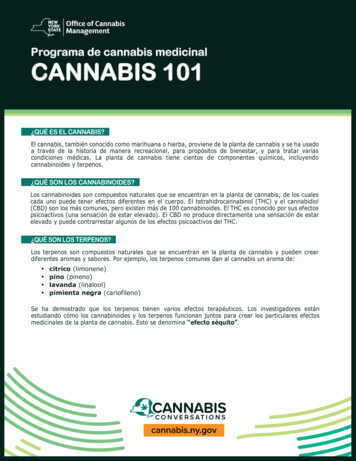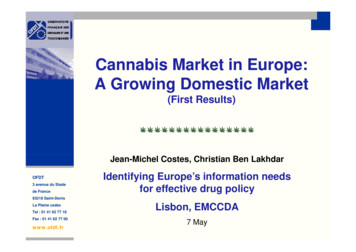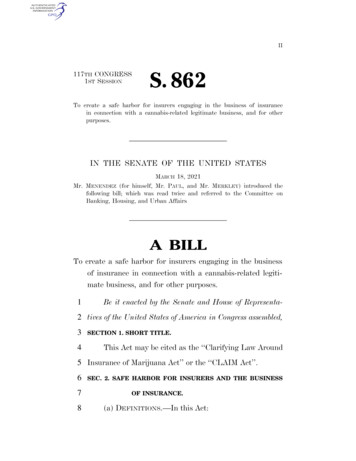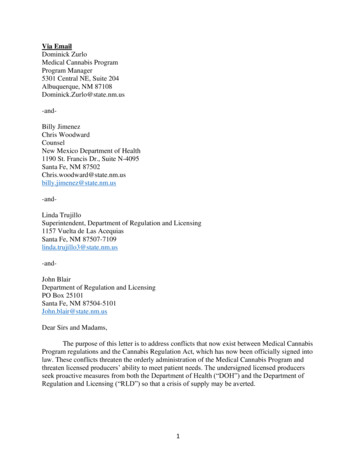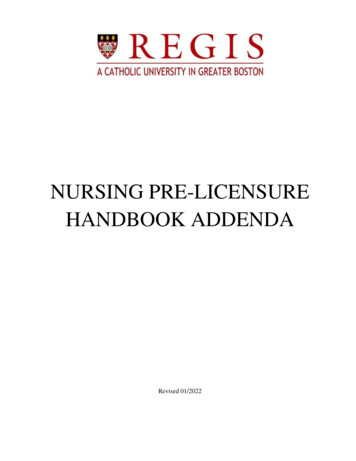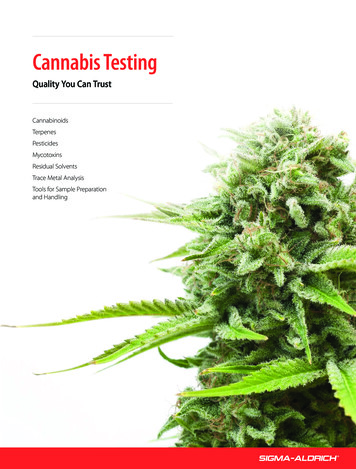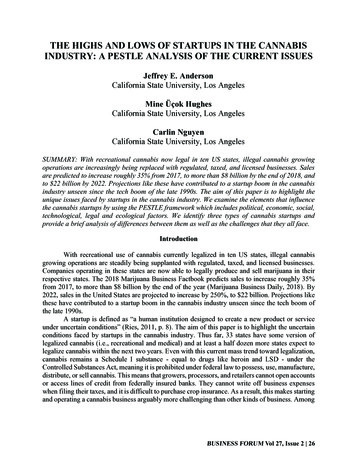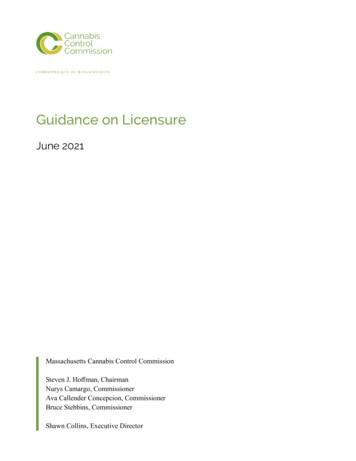
Transcription
Guidance on LicensureJune 2021Massachusetts Cannabis Control CommissionSteven J. Hoffman, ChairmanNurys Camargo, CommissionerAva Callender Concepcion, CommissionerBruce Stebbins, CommissionerShawn Collins, Executive Director
Table of ContentsI.Introduction . 6II.License Types & Limits . 7Medical Marijuana Treatment Center (MTC) . 7Marijuana Cultivator . 7Craft Marijuana Cooperative. 9Marijuana Product Manufacturer . 9Marijuana Retailer . 9Existing Licensee Transporter . 9Third-Party Transporter. 9Marijuana Research Facility. 10Independent Testing Laboratory (ITL) . 10Standards Testing Laboratory . 10Microbusiness. 10Marijuana Courier Licensee . 11Marijuana Delivery Operator Licensee . 11Social Consumption Establishment. 12Delivery Endorsement . 12Limits on Licenses and Endorsements . 13III.Application, License, and License Change Fees . 15Adult-Use Fees . 16Fee Waivers . 17Medical-Use Fees . 18Other Fees Associated with Licenses . 18IV.Licensure Overview . 19License Application Process . 19License Application—Application of Intent Section . 20
Required Individuals and Entities . 20Disclosure of In-State Interests . 21Disclosure of Out-of-State Interests . 21Capital Resources . 21Bond or Escrow . 22Property Identification and Interest Documentation . 23Host Community Agreement Certification . 24Community Outreach Meeting Attestation and Documentation . 24Plan to Remain Compliant with Local Ordinances . 26Plan to Positively Impact Disproportionately Harmed People. 26Application Fee . 27License Application—Background Check Section . 27Background Check Information . 27Background Authorization Forms . 28License Application—Management and Operations Profile Section . 29Business Information, Articles of Organization, and Bylaws . 29Certificates of Good Standing . 29Business Plan, Liability Insurance Plan, & Proposed Timeline. 30Summary of Operating Plans, Policies, and Procedures . 30Diversity Plan . 32License Application—Additional Requirements for Certain License Types. 33MTCs. 33Marijuana Cultivators . 34Craft Marijuana Cooperatives . 34Marijuana Product Manufacturers . 35Marijuana Microbusinesses . 35Marijuana Retailers . 35Independent Testing Laboratories . 36
Marijuana Courier . 36Marijuana Delivery Operator . 37Social Consumption Establishment. 38License Application for Marijuana Couriers, Marijuana Delivery Operators, and SocialConsumption Establishments . 38Pre-Certification Application . 39Provisional License Application . 40Order of Review . 40Priority Applications . 41Expedited Applications . 41General Applications . 42Responding to a Request for Information (RFI) . 42Application Deemed Complete . 43License Process . 44Provisional Licensure . 44Final Licensure . 46Commence Operations . 47V.License Renewals . 47License Renewal Requirements . 47License Renewal Questions & Answers . 50VI.License Changes . 53VII.Compliance and Enforcement . 55VIII.Appendix . 56Appendix A: Licensure Flow Chart . 56Appendix B: License Application Checklist . 58Application of Intent Section . 58Background Check Section . 59Management and Operations Profile Section . 59
Application Fee Section . 60Questions? . 60
I.IntroductionThe Cannabis Control Commission (Commission) regulates licensees that operate in the legal adult- andmedical-use marijuana markets in Massachusetts. This includes reviewing applications and issuinglicenses for adult-use Marijuana Establishments (MEs) and Medical Marijuana Treatment Centers(MTCs), formerly known as Registered Marijuana Dispensaries (RMDs).The Commission’s goal is for this guidance to assist applicants and licensees with navigating theapplication and licensing processes, and remaining compliant with applicable laws, regulations, andpolicies, which include the following: St. 2017, c. 55, An Act to Ensure Safe Access to MarijuanaG.L. c. 94G, Regulation of the Use and Distribution of Marijuana Not Medically PrescribedG.L. c. 94I, Medical Use of MarijuanaRegulationso 935 CMR 500.000: Adult Use of Marijuanao 935 CMR 501.000: Medical Use of MarijuanaGuidance DocumentsPlease note that applicants and licensees are required to remain current with the laws, regulations, andpolicies governing licensure. Applicants and licensees are responsible for reviewing revisions to thisdocument as changes to laws, regulations, and policies may occur.FYI—For Your InformationSome things to be conscious of when applying to become a licensee: The Commission reviews applications for licensure in a certain order set by regulations.An initial review of your application may not occur right away as other applicationsmay have priority or expedited review. The Commission will notify applicants and licensees of all next steps— please donot take next steps until directed to do so.Please ensure that all requests for information are fully complied with in order to reduce the timeto obtain licensure, if appropriate.The following guidance is not legal advice. If you have additional questions regarding the legalrequirements for licensure in the Commonwealth, you are encouraged to consult an attorney.6
II.License Types & LimitsApplicants can determine the type of license they want to obtain by first determining what type ofmarijuana business they want to operate. For example, an applicant that wants to cultivate marijuana hasat least four (4) different options depending on whether they want to operate in the adult- or medical-usemarket and how they want to operate their business: Applicants who want to grow and cultivate adult-use marijuana may apply for one of three (3)ME licenses: Marijuana Cultivation license, Craft Marijuana Cooperative license, orMicrobusiness license. Further information about each license type is available below.Applicants who want to assist registered patients with medical marijuana can obtain an MTClicense, which will allow them to cultivate, produce, dispense, and deliver marijuana toregistered patients and their caregivers.Medical Marijuana Treatment Center (MTC)A Medical Marijuana Treatment Center, commonly referred to as an MTC, is an entity licensed underthe medical regulations. An MTC acquires, cultivates, possesses, processes, transports, sells, distributes,delivers, dispenses, or administers marijuana, products containing cannabis or marijuana, relatedsupplies, or educational materials to registered qualifying patients or their personal caregivers formedical use. This license type is commonly referred to as a vertically integrated license as it allows andrequires the licensee to perform all associated operations.MTCs may deliver marijuana and marijuana products directly to patients and caregivers after receivingCommission approval.Marijuana CultivatorA Marijuana Cultivator may cultivate, process, and package marijuana, to transfer marijuana to otherMEs, but not to consumers. Cultivators must select what tier they will be in by determining the totalcanopy they will cultivate. Canopy is an area calculated in square feet and measured using clearlyidentifiable boundaries of all areas(s) that will contain flowering and/or vegetative plants that are largerthan 8 inches tall and 8 inches wide at any point in time. The available tiers include the following:7
Tier Canopy Size Allowed1up to 5,000 square feet25,001 to 10,000 sq. ft.310,001 to 20,000 sq. ft.420,001 to 30,000 sq. ft.530,001 to 40,000 sq. ft.640,001 to 50,000 sq. ft.750,001 to 60,000 sq. ft.860,001 to 70,000 sq. ft.970,001 to 80,000 sq. ft.1080,001 to 90,000 sq. ft.1190,001 to 100,000 sq. ft.A Marijuana Cultivator may submit an application to change the tier in which it is classified. Onceprovisionally licensed, a licensee may voluntarily relegate its tier. However, if a licensee requests toexpand their tier, they must demonstrate that while operating at the top of its tier it has sold 85% of itsproduct consistently over the preceding six (6) months. Therefore, an applicant should ensure that thetier it chooses is appropriate until able to demonstrate this requirement because it may not be able toexpand until at least six (6) months after receiving a commence operations notice.In connection with the renewal of a Marijuana Cultivator license, the Commission will review therecords of the licensee and may reduce the licensee’s tier if the licensee sold less than 70% of what itproduced during the six (6) months prior to the renewal application (indoor cultivators) or during theharvest season prior to the application for renewal (outdoor cultivators). Some factors that theCommission may consider in reducing a Marijuana Cultivator’s tier include the following: Cultivation and production history, including any catastrophic events that may have occurred;Transfer, sales, and excise tax payment history;Existing inventory and inventory history;Sales contracts; andAny other factors relevant to ensuring responsible cultivation, production, and inventory8
management.Craft Marijuana CooperativeA Craft Marijuana Cooperative is a type of Marijuana Cultivator which may cultivate, obtain,manufacture, process, package, and brand marijuana and marijuana products to transport marijuana toMEs, but not to consumers.A Craft Marijuana Cooperative is not limited to a particular number of cultivation locations, but islimited to a total canopy of 100,000 square feet and three (3) locations for activities authorized forMarijuana Product Manufacturers. A Craft Marijuana Cooperative must operate according to the sevencooperative principles published by the International Cooperative Alliance in ive-identity).Marijuana Product ManufacturerA Marijuana Product Manufacturer is an entity authorized to obtain, manufacture, process, and packagemarijuana and marijuana products, to transport marijuana and marijuana products to MEs, and totransfer marijuana and marijuana products to other MEs, but not to consumers.Marijuana RetailerA Marijuana Retailer is an entity authorized to purchase, repackage, white label, and transportmarijuana or marijuana products from MEs, and to sell, repackage or otherwise transfer marijuana andmarijuana products to other MEs and to sell to consumers.A Marijuana Retailer provides a retail location which may be accessed by consumers 21 years of age orolder or, if the retailer is colocated with an MTC, by individuals who are also registered qualifyingpatients or personal caregivers. Unless also licensed separately as a Social Consumption Establishment,marijuana shall not be consumed on the premises.Existing Licensee TransporterAn ME that is otherwise licensed by the Commission and also licensed to purchase, obtain, and possessMarijuana or Marijuana Products solely for the purpose of transporting, temporary storage, sale anddistribution on behalf of other MEs or MTCs to other establishments, but not to consumers.Third-Party TransporterA Marijuana Transporter is an entity that may only transport marijuana or marijuana products and doesnot hold another ME license and is not licensed as an MTC. A Third-party Transporter is permitted to9
transport marijuana and marijuana products between MEs and between MTCs.Marijuana Research FacilityA Marijuana Research Facility licensee or Research Licensee is an academic institution, non-profitcorporation, domestic corporation, or entity authorized to do business in Massachusetts. A MarijuanaResearch Facility may cultivate, purchase, or otherwise acquire marijuana for the purpose of conductingresearch regarding marijuana and marijuana products if the licensee possesses such a license (such asMarijuana Cultivator, Marijuana Product Manufacturer, Marijuana Retailer, a Microbusiness or a CraftMarijuana Cooperative license) to do so or is allowed to do so through an approved Research Permit ifthe cultivation or product manufacturing process is the subject of its research.All Marijuana Research Facility licensees are required to obtain a Research Permit for each individualresearch projects. Research Permits are certificates indicating approval from the Commission to conducta specific research project over a specified and finite period of time. A separate application andapplication requirements apply to each Research Permit.Independent Testing Laboratory (ITL)An Independent Testing Laboratory, commonly referred to as an ITL, is an entity that does not hold anyother type of ME/MTC license and is properly accredited to perform tests in compliance with thestringent requirements of the Commission’s protocols for testing marijuana and marijuana products.Licensed ITLs may test marijuana and marijuana products in the adult- and medical- use markets.ITLs shall be accredited to the most current International Organization for Standardization (ISO) 17025by a third-party accrediting body that is a signatory to the International Laboratory AccreditationCooperation (ILAC) Mutual Recognition Arrangement prior to final licensure. Additionally, ITLs, andthe individuals and entities associated with it, shall be independent financially from any licensed MTCor ME.Standards Testing LaboratoryA Standards Testing Laboratory is an entity that would otherwise qualify to be an Independent TestingLaboratory, but instead performs blind tests to verify the results of an Independent Testing Laboratoryat the request of the Commission.MicrobusinessA Microbusiness is a colocated Tier 1 Marijuana Cultivator, and/or Marijuana Product Manufacturerlimited to purchase 2,000 pounds of marijuana from other MEs in one (1) year.10
A Microbusiness licensee may not be a Person or Entity Having Direct or Indirect Control for any otherME except a Social Consumption Establishment. A majority of the Microbusiness’ executives ormembers must have been residents of Massachusetts for no less than 12 months prior to application.Microbusiness may apply for a Delivery Endorsement which would allow the licensee to sell anddeliver marijuana or marijuana products produced at its licensed location directly to consumers.Marijuana Courier LicenseeA Marijuana Courier licensee may deliver marijuana or marijuana products directly to consumers orpatients at a residential address from a Marijuana Retailer or Medical Marijuana Treatment Center withwhich the Marijuana Courier has a delivery agreement. A delivery agreement sets forth the businessterms of their agreement, as well as procedures for pre-verification of consumers receiving deliveries. AMarijuana Courier is not a retailer and shall not have a retail location accessible to the public unlessthey are also licensed as a Marijuana Retailer. Deliveries of marijuana or marijuana products are limitedto the following: municipality of the Marijuana Courier’s place of business; municipalities that allow for the operation of Marijuana Retailers; and municipalities that opt-in (ie any municipality which, after receiving notice from theCommission, has notified the Commission that delivery may operate within its borders) todelivery.A Marijuana Courier license shall be limited on an exclusive basis to businesses controlled by and withmajority ownership comprised of Economic Empowerment Priority Applicants and/or Social EquityProgram Participants for a period of at least 36 months from the date the first Marijuana DeliveryOperator receives a notice to commence operations.Please note that the Commission will be collecting data and information over this period. TheCommission will evaluate whether the goals of this initiative were met and, if not, may further extendthe exclusivity period.Marijuana Delivery Operator LicenseeA Marijuana Delivery Operator may purchase at wholesale and warehouse finished marijuana ormarijuana products acquired from a Marijuana Cultivator, Marijuana Product Manufacturer,Microbusiness or Craft Marijuana Cooperative, and sell and deliver directly to consumers. A MarijuanaDelivery Operator Licensee is not considered to be a Retailer under the Commission’s regulations but isresponsible for complying with all applicable Department of Revenue requirements for retail sales.11
A Marijuana Delivery Operator licensee shall be limited on an exclusive basis to businesses controlledby and with majority ownership comprised of Economic Empowerment Priority Applicants and/orSocial Equity Program Participants for a period of at least 36 months from the date the first MarijuanaDelivery Operator receives a notice to commence operations.Please note that the Commission will be collecting data and information over this period. TheCommission will evaluate whether the goals of this initiative were met and, if not, may further extendthe exclusivity period.Social Consumption EstablishmentSocial Consumption Establishment means an entity licensed to sell marijuana or marijuana products andallow consumers to consume marijuana or marijuana products solely on its premises. The applicationfor this license will be made available only after six (6) communities have been selected to participate inthe Commission’s Social Consumption Pilot Program.Social Consumption Establishment licenses are limited on an exclusive basis to businesses controlled byand with majority ownership comprised of Economic Empowerment Priority Applicants or SocialEquity Program Participants, Microbusinesses, and Craft Marijuana Cooperatives for a period of at least36 months from the date the first Social Consumption Establishment receives a notice to commenceoperations.Please note that the Commission will be collecting data and information over this period. TheCommission will evaluate whether the goals of this initiative were met and, if not, may further extendthe exclusivity period.Delivery EndorsementIn addition to the license types discussed above, the Commission may approve Delivery Endorsementsto qualifying MEs. A Delivery Endorsement authorizes the licensee to sell and deliver marijuana andmarijuana products directly from the licensee’s licensed establishment to consumers. This endorsementis currently available to MEs that are licensed as Microbusinesses and controlled by and with majorityownership comprised of Economic Empowerment Priority Applicants and/or Social Equity ProgramParticipants for a period of at least 36 months from the date the first Marijuana Delivery Operatorreceives a notice to commence operations.Please note that the Commission will be collecting data and information over this period. TheCommission will evaluate whether the goals of this initiative were met and, if not, may further extend12
the exclusivity period.Limits on Licenses and EndorsementsAs discussed previously, all license types have limits on the number of licenses an individual or entitycan possess. Additional restrictions may apply to certain license types. The grid below will be helpfulwhen determining what license type to choose when applying, and to understand the limits on licensetypes.FYI—For Your InformationThe table below uses specifically defined terms, for example, Person or Entity Having Director Indirect Control. Most terms will be defined in the Commission’s regulations in sections935 CMR 500.002 and 501.002 If you encounter a term and don’t know it’s meaning, pleasecheck the definition sections in the stated regulations for their meaning.TypeLimitsAdditional LimitationsMTCNo Person or EntityHaving Direct or IndirectControl shall be grantedmore than three (3) MTClicenses.An MTC can acquire ME licenses, however, noPerson or Entity Having Direct or Indirect Controlshall be granted more than a total of 100,000 sq. ft. ofcanopy between this license and the adult-useMarijuana Cultivator license. The 100,000 sq. ft.canopy cap applies across the board to all licensetypes or combinations of license types issued by theCommission.MarijuanaCultivatorNo Person or EntityHaving Direct or IndirectControl shall be grantedmore than three (3)licenses.No Person or Entity Having Direct or Indirect Controlshall be granted more than 100,000 sq. ft. of canopybetween this license and an MTC license.Craft MarijuanaCooperativeCraft MarijuanaCooperatives are limitedto one (1) license.Members may not be Persons or Entities HavingDirect or Indirect Control in any other ME. Suchrestriction shall not be construed to prohibit thelicensee from applying for a Marijuana Retailer,Existing Licensee Transporter, Marijuana Research orSocial Consumption Establishment Licensee.13
Standards Testing No Person or EntityLaboratoryHaving Direct or IndirectControl shall be grantedmore than three (3)licenses.No Person or Entity Having Direct or Indirect Controlshall have another type of MTC or ME license.MicrobusinessNo Person or EntityHaving Direct or IndirectControl shall be grantedmore than three (3)licenses.The licensee(s) shall not be a Person or Entity HavingDirect or Indirect Control for any other ME except aMicrobusiness can have a Delivery Endorsement orhave a Social Consumption Establishment license,provided that Licenses shall be limited on anexclusive basis to businesses controlled by and withmajority ownership comprised of EconomicEmpowerment Priority Applicants or Social EquityProgram Participants.Third-PartyTransporterNo Person or EntityHaving Direct or IndirectControl shall be grantedmore than three (3)licenses.The entity shall not hold any other license type,however, individuals and other entities associatedwith the license may have interest in other licensetypes.Existing LicenseeTransporterNo Person or EntityHaving Direct or IndirectControl shall be grantedmore than three (3)licenses.The entity shall hold another license type.Marijuana Courier No Person or EntityHaving Direct or IndirectControl shall be grantedmore than (2) two types ofDelivery licenses.Licenses shall be limited on an exclusive basis tobusinesses controlled by and with majority ownershipcomprised of Economic Empowerment PriorityApplicants or Social Equity Program Participants for aperiod of 36 months from the date the first MarijuanaDelivery Operator receives a notice to commenceoperations.14
MarijuanaNo Person or EntityDelivery Operator Having Direct or IndirectControl shall be grantedmore than (2) two types ofDelivery licenses.Licenses shall be limited on an exclusive basis tobusinesses controlled by and with majority ownershipcomprised of Economic Empowerment PriorityApplicants or Social Equity Program Participants for aperiod of 36 months from the date the first MarijuanaDelivery Operator receives a notice to commenceoperations.Soc
ITLs shall be accredited to the most current International Organization for Standardization (ISO) 17025 by a third-party accrediting body that is a signatory to the International Laboratory Accreditation Cooperation (ILAC) Mutual Recognition Arrangement prior to final licensure. Additionally, ITLs, and
